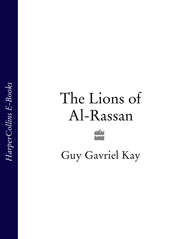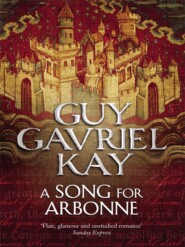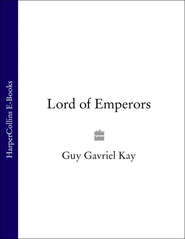По всем вопросам обращайтесь на: info@litportal.ru
(©) 2003-2025.
✖
River of Stars
Настройки чтения
Размер шрифта
Высота строк
Поля
“I don’t …” She is finding it difficult to speak. “I don’t think I will be so much worth watching.”
His smile, celebrated, harnessed to the intransigence of courage. “I think you will,” says Lu Chen.
He bows to her. Does it twice. Walks from the room.
Closes the door quietly behind him.
She stands where she has been standing. She is aware of her breathing, the beating of her heart, is conscious of her body in a new way. She sees the lamp, the books, flowers, the bed.
One difficult breath. Her mouth a thin line of determination. She will not live the life others choose for her.
She crosses the room, opens the door.
The hallway is dark but the light from her room spills into it. He turns at the sound, a figure in the corridor, halfway along. She steps into the hallway. She looks at his dark shape in the shadows the world offers her (offers all of them). But there is light. Behind her in the room, and sometimes there may even be light ahead. He has stopped. She can see he has turned to look at her. There will be light for him to see her, where she stands.
“Please?” she says.
And extends a hand, holding it out towards the shape of a good man, in the darkness of a house that is not hers, and a world that is.
CHAPTER III
Military Officer Zhao Ziji, attached to a garrison in Hsiang Prefecture in the central rice lands south of the Great River, was sweating in hidden leather armour as his party walked through midsummer heat.
He wore a wide-brimmed merchant’s hat and a rope-belted hemp tunic over loose trousers as a disguise. His throat was dry as a desert bone, and he was ferociously angry with the lazy incompetents he was shepherding north like so many lambs through dangerous country towards the river. He was unable, in fact, to think of many occasions when he had been less happy.
Perhaps as a boy, when his sisters had seen him urinating once and had begun making jokes about the size of his private parts. He had beaten them both for it, which was his right, but that never stopped mockery once it started, did it?
You had to go off when you were old enough and do something reckless: join the army in a district far from home, to get entirely away from such laughter and the nicknames based on it. Even then you could lie in your cot in a barracks and imagine someone from home arriving in the morning, joining your company, and greeting you with a cheerful “Hai, Ziji Shortcock!” thereby afflicting your life here, too.
It wasn’t even true, for one thing. Not one singing girl had ever commented! Nor had any soldier, pissing beside him in a field or a latrine, raised an eyebrow, in any of the companies he’d served with or led. It had been utterly unfair for the girls to say such things about an eleven-year-old.
One of his sisters was dead, he’d wish or think no ill of her, for fear of rousing a ghost. The other was married to a man Ziji understood to be harsh with her when he drank, and had a mother-in-law with a sour disposition. He ought to feel sympathy. He didn’t. You said certain things, damaged someone’s life, and your own fate might take a different course because of it. Ziji believed that.
He also believed—indeed, he knew with certainty—that the hilly country through which they were now passing, carrying their prefect’s birthday gift for Deputy Prime Minister Kai Zhen, and three nightingales in cages for the emperor’s garden, was a place that just about bred outlaws.
The cages had been difficult to hide. They were in sacks, tied on the donkeys. He hoped the nightingales wouldn’t die. It would be bad for him if they did.
He never stopped looking around as they went. He kept imagining bandits springing up, armed and wild, from the brown grass by the path, from behind hummocks, surging from copses of trees or the darker woods they passed.
He had twelve men, seven of them soldiers. They had disguised themselves and the treasure they carried. They were on foot, carrying travellers’ packs, only six donkeys for the whole party’s gear. They looked like lesser merchants who had banded together heading for the river, not affluent enough to be riding, not obviously worth robbing—but enough of them to dissuade bandits from doing something foolish. Outlaws liked easy targets, not real fighting.
On the other hand, Ziji wasn’t certain his men would fight, if it came to that. He had begun, days ago, to regret having pushed himself forward as the man to lead the prefect’s party this year. Of course it was an honour; of course if they got to Hanjin and were well received (or received at all) it would redound to the prefect’s name—and Zhao Ziji’s. This was how you rose in rank, wasn’t it? Earned enough eventually to take a wife, have sons of your own.
Or, instead, how you got yourself killed in bandit country in a baked-out summer. Or endured angry muttering from those you were commanding (soldiers and civil servants, both) and were pushing through broiling heat towards the safety of a boat. Once on the water they could go downriver to the Grand Canal. Once on a canal flatboat they were, essentially, safe and in the capital.
But you had to get to the river first, and they were, Military Officer Zhao judged, still two nights away. This evening they should be able to reach a village he knew. Tomorrow was likely to require camping out, a fire, rotating guards. He was driving his party hard, but if he didn’t it was going to be three nights, not two. Not a good idea.
In both the last two years, the deputy prime minister’s birthday gifts from Hsiang Prefecture, where Kai Zhen had been posted for many years, had not reached illustrious Minister Kai, the honoured patron of the honourable prefect of Hsiang.
Ziji had been frightening his party with threats of tigers and bandits and a rumour of ghosts and fox-spirits lurking on this trail after dark. (He was afraid of fox-spirits himself.)
But some of their group were bureaucrats, not pleased about having been instructed by the prefect that they were to accept the command of a soldier all the way to Hanjin. Once there, the magistrate in the party would take control, but not until they were inside Hanjin’s walls. There had been no ambiguity in the orders when they’d departed. Ziji had made it a condition of his volunteering for the task. (No one else had wanted it, not after the last two years.)
All of his party were wilting like spring flowers in summer drought. Well, he was suffering, too, Ziji thought. He wasn’t urging them along in this harsh white sunlight for his pleasure. He’d have happily travelled by night, but the danger was overwhelming.
The moaning was constant. You’d have thought they’d be smart enough to save their energy. He had promised a midday rest, and it wasn’t midday yet. On the other hand, he thought, smelling his own sweat, feeling how it had soaked his armour under the tunic, it was getting close to it, and there were all those tales of party leaders murdered by their men. After which the story was always given out by the ones who survived that the leader had been drunk, incompetent, disrespectful of his prefect or even the emperor. One or two or all of those things.
He’d heard those stories. He’d actually believed some of them in the past. He didn’t any more.
“Rest stop on that rise ahead!” he suddenly called out.
His voice was a cracked croak. He cleared his throat and said it again. “There should be shade, and we can see both ways up there. We’ll go double-quick when we start up again, though, to make the village for tonight. I am telling you all now!”
They were too exhausted to cheer. Or too angry with him. As of yesterday the magistrate had insisted on riding one of the donkeys. He was older, it didn’t ruin their disguise, but he was the one the others kept approaching for low-voiced exchanges, with sidelong glances at Ziji. Did they think he couldn’t see those looks?
On the whole, a rest was probably wise. It wouldn’t do his career any good if he was murdered by his own party. Ho, he thought. A joke! His ghost could torment them, but that wouldn’t help him much in the matter of a promotion and a wife one day.
He’d remembered rightly from three trips to the river: there was a level spot at the top of this rise. The upward slope was long, but the promise of rest carried them there.
From up here he could indeed see the dusty road both ways, north and south. There was a dense wood to the east and a smaller stand of oak trees on the west side of the roadway. Ziji sank down beneath one of those oaks, after guiding the donkeys into the shade. He liked animals, and he knew they were suffering.
He’d heard a wandering holy man, one of those from the high plateaus of Tagur (which had once been an empire, some said), preaching back home to a ragged crowd that if a man behaved badly in life he would return as an animal of some kind, to make amends for his errors. Young Ziji didn’t exactly believe it, but he did recall the simple piety of that man in his dark-red robe, and he treated his animals as well as he could to this day. They didn’t mumble and plot against you, he thought.
He remembered something. With an effort and a curse, he made himself get up and pull back the cloth from the three birdcages. The cages were made of beaten gold, studded with gems, far too valuable to be exposed, but there was no one up here to see, and the birds were at risk of dying under covers in this heat. They weren’t going to sing, not in cages at midday.
Before going back to his tree past sprawled, exhausted men (some were already asleep, he saw) Ziji stepped into the road again, in the brutal sun, and looked both ways.
He swore viciously. The magistrate glared at him, in mid-swig from a water flask. The very refined magistrate of Hsiang Prefecture didn’t like soldiers’ language. Well, fuck you with a shovel, Zhao Ziji thought. You don’t like the way soldiers talk, you try getting yourself to the river without them!
And without dealing with the imminent arrival of another party from along the road behind them. They hadn’t been able to see them while on level ground. Up here they could. That was why a fucking soldier had waited until they’d reached this point to stop.
He rasped an order for one of his men to cover the cages. Those coming up to the long slope, openly, on a midday road, were almost certainly another party of merchants, but merchants could whisper of gilded, gem-covered nightingale cages as readily as anyone.
The other party showed a natural anxiety as they reached the point on the upward slant of the road where a dozen or so men could be seen sitting or lying among trees by the path.
Ziji had gone back to sitting against an oak. His short sword was hidden beneath his long, loose tunic. He was aware that the other soldiers in their party, unhappy as they were, were also disinclined to be killed, and would be alert. But then the magistrate stood up, officious and foolish, and sketched a bow that proclaimed, for anyone who knew enough to recognize it, that he was no humble merchant on the road.
“Greetings to your company. Have you any wine with you?” he asked.
Ziji winced, barely restrained himself from swearing.
“None!” exclaimed the leader of the other party. “None at all! We have nothing you might wish to steal! You would not kill men for water!”
“It has happened.” The magistrate chuckled, thinking himself witty.
“There’s a stream not far ahead!” cried one of the other party. “It hasn’t dried up! You need not—”
“We mean you no harm,” Ziji said from where he sat.











